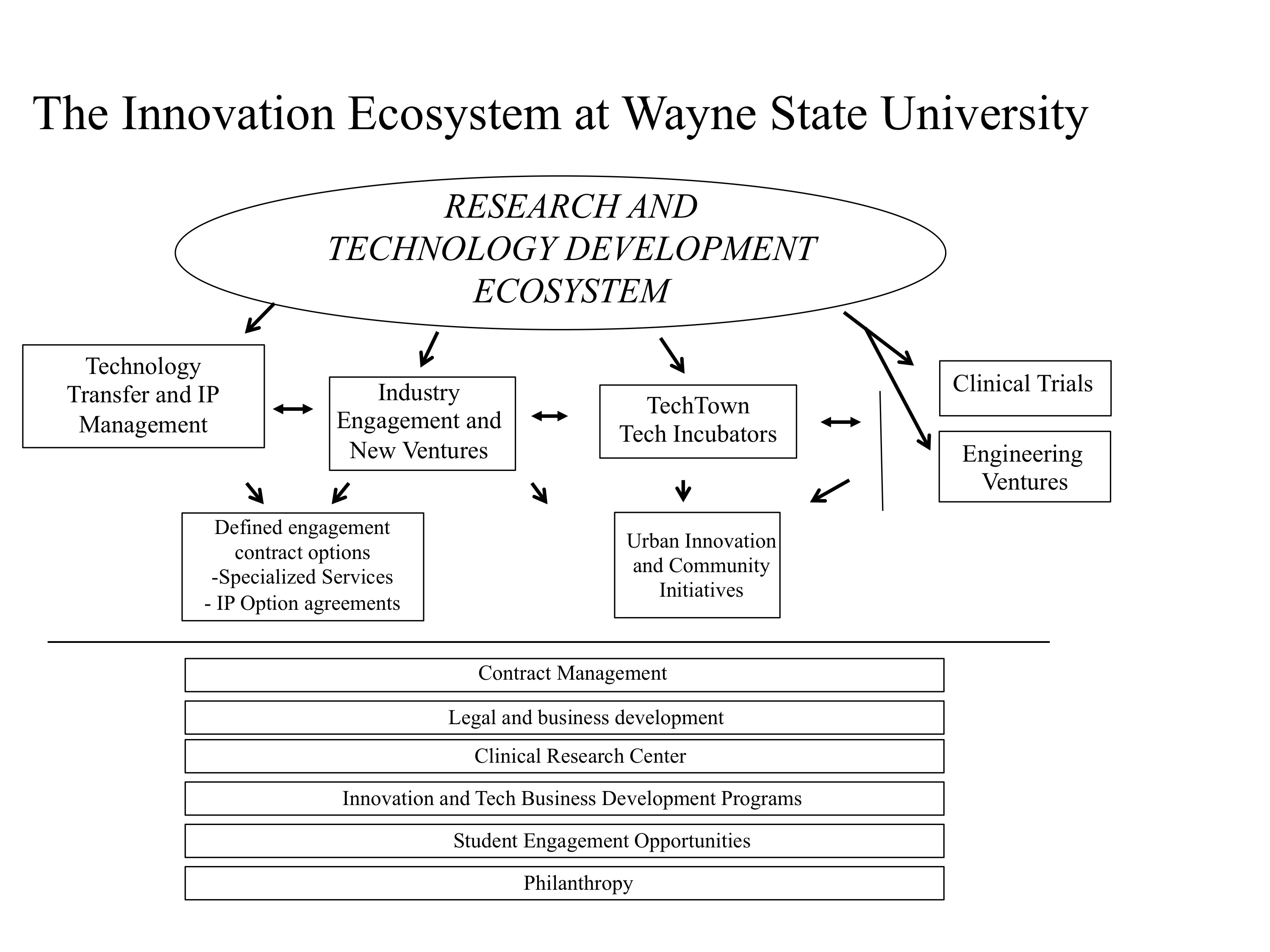Research and Technology Ecosystem
Wayne State University, founded in 1868, is a nationally recognized public, urban research university in Detroit. Wayne State is Michigan's only urban research university, and is known internationally for its contributions to the sciences. Wayne State University holds the highest Carnegie Foundation for the Advancement of Teaching designations in both research and community engagement.
Research Expenditures totaled $250.9 M in FY2023 with support from a variety of funding sources including corporate entities, foundations and federal agencies such as the National Institutes of Health, the National Science Foundation and the Department of Defense.
- In 2015, Wayne State University opened a new $93 million Integrative Biosciences Center (IBio) with thematic foci in multiple areas including environmental sciences, bio and systems engineering, heart disease, metabolic diseases (diabetes, obesity) and brain and biobehavioral health, with plans to recruit 30 new faculty members for research and development programs in integrative biosciences. The IBio Includes space dedicated to expanding partnerships with Henry Ford Hospital System.
- Home to one of the 45 National Cancer Institute-designated comprehensive cancer centers in the United States, the Barbara Ann Karmanos Cancer Institute.
- Establishment and operational management of a number of enabling instrumentation cores and resources (advanced instrumentation labs) for industry access.
- The university has made substantial investments and enhancements in its technology transfer and commercialization initiatives with current info on technologies and engagement platforms at http://research.wayne.edu/techtransfer/index.php. This includes the development of new sponsored research agreement options for industry engagement and expansion of the Wayne State University technology incubator TechTown facility, which is an urban research and technology business park located adjacent to IBio in the north section of the Wayne State University campus http://techtowndetroit.org.
- Establishment of the $25M James and Patricia Anderson Engineering Ventures Institute https://engineering.wayne.edu/entrepreneurship/anderson/index.php.
- Member of the University Research Corridor, an alliance of Michigan's three research institutions that includes the University of Michigan and Michigan State University. The University Research Corridor innovation cluster is ranked second upon such clusters on a national level (Innovation Power Rankings).
More information about research at Wayne State University can be found at research.wayne.edu.
Wayne State University's campus, located in the Cultural Center and Historic District in the heart of Detroit's Midtown neighborhood, encompasses approximately 200 acres. The university enrolls nearly 28,000 students, making it the third largest among Michigan's 15 public universities and one of the 50 largest in the nation.
The university's comprehensive academic offerings are divided among 13 schools and colleges: Mike Ilitch School of Business; College of Education; College of Engineering; College of Fine, Performing and Communication Arts; Graduate School; Law School; College of Liberal Arts and Sciences; School of Information Science; School of Medicine; College of Nursing; Eugene Applebaum College of Pharmacy and Health Sciences; Irvin D. Reid Honors College; School of Social Work. Wayne State University and Detroit are home to the Perinatology Research Branch of the National Institutes of Health and the Karmanos Cancer Institute, a National Cancer Institute-designated comprehensive cancer center.
Wayne State has had some major accomplishments in recent years, and has some new projects expected in the near future. These include:
- Carnegie Classification of R:1 Doctoral Universities Highest Research Activity and also Highest rating for Community Engagement
- Home to the Barbara Ann Karmanos Cancer Institute, one of the 45 National Cancer Institutesdesignated comprehensive cancer centers in the US
- Home to the Perinatology Research Branch of the National Institutes of Health, one of the few intramural branches located outside NIH's main campus in Maryland
- Member of the University Research Corridor, an alliance of Michigan's three research institutions
- 2015 - new $93M Integrative Biosciences Center ("IBio")
- 2018 - new $60M Mike Ilitch School of Business
- 2019 - new residence housing (800 beds)
- 2020 - new $35M STEM education center
- 2021 - new $65M Hillberry Gateway Performance Complex - theatre, music, dance
The City of Detroit, with its storied history in innovation, is at an exciting point in its history with rapidly expanding development activities and true rebirth. Its vibrant downtown and cultural center envelop the WSU campus. With its large presence in the downtown area and its activities related to economic development, research and education, WSU plays a key role in the rapidly accelerating forward growth of the city. With immediate proximity to Canada and its location in the middle of the Great Lakes region along with professional sports, opera and symphony, Detroit and the metropolitan area (~5 million population) provide a rich culture with exceptional recreational and entertainment activities.
Selected Research Relationships
- University Research Corridor (http://urcmich.org) - Wayne State University, Michigan State University and the University of Michigan.
- Health Service Providers, Academic Medicine Partners and the Wayne State University School of Medicine
- The Detroit Medical Center, the Henry Ford Health System and the Perinatology Research Branch are affiliated with Wayne State University through joint research initiatives, clinical care delivery and student and resident training.
- Detroit Medical Center - The Detroit Medical Center includes a 110-acre campus located in Midtown Detroit as well as three additional hospital sites in Southeast Michigan. Its hospitals include Children's Hospital of Michigan; Detroit Receiving Hospital and University Health Center; Harper University Hospital; Huron Valley-Sinai Hospital; Hutzel Women's Hospital; the Kresge Eye Institute; Surgery Hospital; Rehabilitation Institute of Michigan; and Sinai-Grace Hospital. The system has 2,700 licensed beds, 3000 affiliated physicians and serves as primary major teaching and clinical research site for Wayne State's School of Medicine.
- Henry Ford Health System (http://www.henryford.com) - Research is a vital component of the mission of Henry Ford Health System and is focused in the following areas: cardiovascular and renal, neurosciences, bone and joint, cancer research, immunology and autoimmune diseases, population health and healthcare outcomes research. Wayne State University and the Henry Ford research teams have a number of joint research initiatives and are co-located in the new IBio research center described below.
